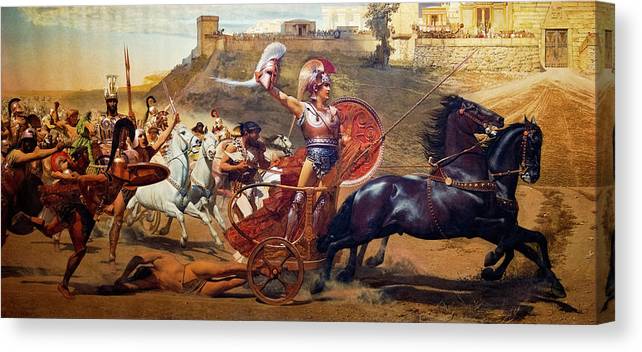 This is a guest post by Shogun Montgomery:
This is a guest post by Shogun Montgomery:
Ideologues are Rewriting Homer’s Classics
It’s common knowledge at this point that Cultural Marxists prefer to stay in academia and influence subsequent generations of students. It was only a matter of time before they got into medieval studies and classics departments to add toxic masculinity, white privilege, and intersectionality as bold footnotes to history.
In the last decade, this trend has targeted Homer’s classics The Iliad and The Odyssey. Feminists are telling the stories of Homer’s classics from the perspectives of the women in those stories, and, in doing so, are ultimately rewriting them with feminist dogma.
The very notion of creating a retelling of these classics perverts the nature of their intent. This is because most fail to understand the true purpose of these stories. Classics professors bare more than their fair share of guilt in this respect.
One such perversion of The Iliad is a book by Pat Barker called The Silence of the Girls. That book made Briseis, Achilles bride taken as the spoils of war, the protagonist. Agamemnon, to appease the God Apollo, must give his woman back to Apollo’s temple, where she was previously a priestess. Agamemnon is upset about this because he likes the woman. He gives her back to the temple but takes Achilles’ woman, Briseis, as compensation for having to give his woman away. This is a great dishonor to Achilles, the greatest Greek warrior, who then refuses to fight in the war, and the central conflict outside of the war itself.
In that book, Briseis watches a romantic sexual relationship between Achilles and Patroclus unfold. When you read The Iliad, however, there is nothing gay about the relationship between Achilles and Patroklus. They are great friends, the sort that call each other brother though they are not blood related. Whether the author’s intent is to stigmatize male friendships by associating them with homosexuality or to rewrite literature to be more “inclusive” other sexual orientations, the interpretation is patently false.
The next book to distort The Iliad was A Thousand Ships by Natalie Haynes. Her book, like Barker’s, focuses on the women of The Iliad; their enslavement, their abductions, etc. These stories actively seek to transform the heroes of The Iliad into villains for their (mis)treatment of women. If it wasn’t for men being violent (a sign of their “fragile masculinity”) women wouldn’t have to suffer.
(As an aside, Haynes appears to have written the characters in her story, the Greek gods and heroes, using modern vernacular. Yet another demonstration that there is nothing less timeless than feminism.)
A recent retelling of Homer’s classic, The Odyssey, comes from Madeline Miller’s Circe, published in April of 2018. This book is not particularly about Odysseus. It is a story from birth to death of Circe, but Homer makes an important appearance. Circe is cast as a sympathetic figure, a goddess who is too awkward and powerful to live on Olympus.
She gets her own island, hones her witchcraft, and falls in love with mortals like Odysseus. In Circe, like all feminist propaganda stories, the title character is portrayed as a victim. She loves but cannot be loved in return. This is a perversion of Homer’s classic, where Circe represents Odysseus’ vice, lust, and must pay a heavy toll for indulging in pleasures of the flesh. Circe, as an immortal, feels ultimately nihilistic about letting a mortal go free after toying with him for a short span.
Margaret Atwood also wrote a feminist twist on The Odyssey called The Penelopiad. This story focuses on the (you guessed it) sexual violence that occurs when Penelope’s suitors rape and abuse her maids. When Odysseus returns and has the maids killed (right after slaying the suitors), Penelope starts to feel guilty about it.
In The Odyssey, Penelope represents the ideal woman. She is the standard bearer for feminine virtues like loyalty and patience. Her maids, on the other hand, display none of those virtues. They are included in the story solely to contrast the virtues of a good woman with the behaviors of bad women.
Stories shape our beliefs. They often portray what the philosopher or theologian cannot explain. They inform us of ideals and inspire to make those ideals reality. Homer’s classics are two of the most important works in all of Western literature and, thus, two of the most important stories to shape Western values.
Feminists, because they perceive that Western men are the sources of all evil, actively want to change the stories that mold men. To do that, they reframe heroes as rapists and traitors as victims. This is precisely what the Hollywood blockbuster Troy tried to do when it glorified the weak pacifists of Troy and villainized the heroic Greeks.
The feminist formula is easy to unravel. Take a classic story of Western history, tell it from a woman’s perspective, include rape and sexual violence, portray every woman as a victim to some man, and let history rewrite itself.
Please give us your valuable comment